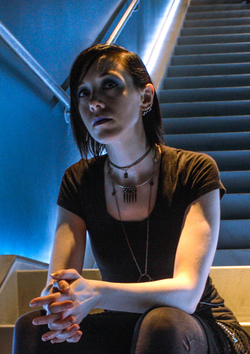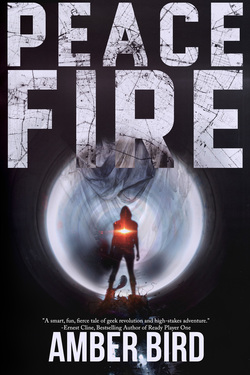
MUSIC MADE ME
In my life, music and books have always been intertwined. I grew up in a home where there were bookshelves full of sci-fi and fantasy and there was always music on the stereo. I have spent as many hours of my life as possible reading whilst listening to music. Every daydream and seed of story since I was a child has come as if summoned by a song I was listening to. It’s no surprise, then, that I find my own writing is tied up with music.
The initial image of Peace Fire, my forthcoming book, came when reading Fool’s Run by Patricia McKillip. I honestly couldn’t tell you what the image I got has to do with that book, but the fact that there’s a band in that book made it seem important and, by commutative properties, made the image it put in my head seem important.
The first mental sketches, where there were action and characters instead of just the image of the main character’s home, were something like music videos. A song would come on that fit the mood of the emerging story, and my brain would flash the whole thing at me in an abbreviated way that fit the timing of the song.
Before I even sat down to write out my plot overview years ago, I made a playlist to write it to, filled with songs that fit the mood I thought I’d be writing for. Once that was done, I put the playlist on a loop and poured out a 20,000 word sketch, my fingers pounding out words to the same beat as the songs. I can read that sketch and still bob my head to the music.
Soon after, when I looked at the landscape of my life and realized I only had enough in me to pursue one creative endeavor, I chose music. And, when I was writing a song where the mood and emotions called up images that were from Peace Fire, I wrote the lyrics that I thought would be the closest that story ever came to being told. Even the alternate versions we made and have discussed for the song (Tied to My Chair, for any fans of the band who’re reading) were influenced by the story. No surprise the book trailer for Peace Fire uses one of those versions and is quite like a music video.
Following the path of music actually prepared me to write prose, not just lyrics and poetry. It was learning how to truly work on art, playing just a piece of a song over and over for hours to get it right or analyzing a song figure out why it was or wasn’t working, that made me able to sit down and do the work or analyze what I’d written. It was learning how to work with other people, something that I dreaded in group projects but could manage in a band, that allowed me to write stories where more than just one person saved the day. It was learning how to keep my audience in mind while creating something true to me that helped me understand what a writing teacher had meant when she told me that, once I decided who my audience were, I would be a great writer. It was learning how to let bandmates or producers suggest changes to my lyrics without getting hurt that let me take feedback from readers and editors.
It was finally seeing something I’d created out in the world that reminded me art didn’t have to be fine art to do good for someone other than me and that made me resolve to not leave my stories untold.
I sat down and made a new playlist quickly, and I started writing. And then I made another playlist, because making music had also taught me it’s no good when every song sounds the same or has the same mood, and it’s no good when every scene in a book feels the same. I needed scenes that went with industrial beats, but I also needed scenes that had quieter or more emotional soundtracks.
Music had also taught me that a world of non-stop winning (happy songs all the time!) feels false and isn’t satisfying. I gritted my teeth and prepared to let bad things happen to my beloved characters.
I lined up playlists, grateful that an MP3 player meant I didn’t have to interrupt my writing regularlys to change CDs or records. I pushed play and I wrote. I let songs carry me through pauses, remind me of the state of the world in the 2050 where my characters lived, and help me feel the way the drum would drive them to action when things didn’t go as expected. I even, finishing up a writing day at 4am, let the songs pull a scene out of me that I had meant to gloss over.
Thinking about the music they would enjoy helped me get to know my characters better. I wish I had been able to make the albums they would listen to in their near future. I’m glad that some of them like “oldies” from the 1970s through the 2010s. To apologize for the hard and sometimes horrible things they would go through, I filled their world with music, and that let me feel enough better that I could follow through when the plot called for bad times.
As a nice side benefit, the music also made me stop sometimes for spontaneous dance parties (there are some songs my hips can’t resist) so that I didn’t just sit in a chair for 12 or more hours every day.
In the end, fiction and music are just two different ways to tell the stories that slip and slide the inside of my skull. If the future is, as my book predicts, a little greyer, it’s the fiction and music that will keep me having good days.

But then somebody blows up the office where Katja is pretending to be a well-behaved wage slave and jolts them into the concrete and clouds of corporeal Seattle. Of brains infiltrated by a clandestine threat.
Can a handful of digital warriors win a war that stretches into the world on the flesh and blood side of their computer screens?
"A smart, fun, fierce tale of geek revolution and high-stakes adventure."
-Ernest Cline, Bestselling Author of Ready Player One
 RSS Feed
RSS Feed
